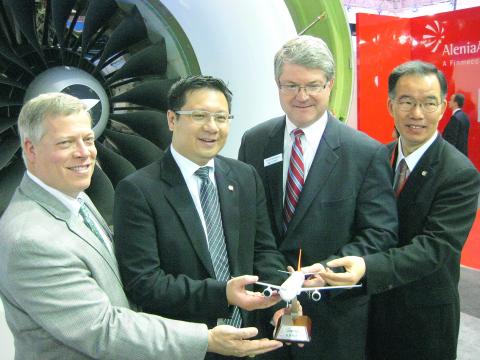TransAsia Airways Corp (復興航空), one of the nation’s leading international air carriers, yesterday signed a US$300 million agreement with United Technologies Corp unit Pratt & Whitney, one of the major players in the design, manufacture and service of aircraft engines, to purchase 27 engines for its 12 new Airbus A321neo aircraft.
The Taiwanese carrier also inked a deal with International Aero Engines AG, a subsidiary of Pratt & Whitney, to buy another 12 engines for the other six A321 aircraft it ordered last year.
The delivery of the engines in the two deals is scheduled to start in 2017, TransAsia said in a statement.

Photo: CNA
“We have adequate funding to pay for the engines without having to resort to borrowing,” TransAsia chairman Vincent Lin (林明昇) told a press briefing after the signing ceremony held at the Singapore Airshow. “We are very excited to be one step closer to delivery.”
The engines TransAsia has purchased from Pratt & Whitney could help its A321neo planes benefit from 15 percent reductions in fuel burn compared with regular engines, further driving down environmental emissions, engine noise and the company’s operating costs, Lin said.
The agreement signed with Pratt & Whitney also included a 10-year maintenance deal for the planes, with the company promising to train TransAsia’s maintenance group to help the Taiwanese carrier offer the safest service possible.
This facilitates TransAsia’s plan to operate its own maintenance hangar at Taiwan Taoyuan International Airport, Lin said.
However, Lin said he could not specify the exact time frame for the opening of the hangar, as he has no idea on how long it would take the airport to hand over the designated land to TransAsia, or even if the airport would approve the plan.
“Once the airport decides to allocate the land to us, we will be able to launch the project within a year,” Lin said.
Currently, the carrier has orders for 20 new planes, on top of the 18-plane fleet it has in operation. Other than the 18 A321 series aircraft, there are two A330-300 planes still to be delivered, with the first due in November.
The orders reflect TransAsia’s plan to fly to all major Asian cities within a nine-hour radius of Taiwan over the next five years, Lin said, adding that the destinations are expected to include cities in Australia, New Zealand and the Middle East.
“I expect the regional destinations covered by TransAsia to double from the current 20,” Lin said.
Lin said the number of seats on TransAsia flights would grow by about 20 percent year-on-year, until the carrier owns enough aircraft to reach its goal.
TransAsia posted NT$629.33 million (US$21.3 million) in net profit, or NT$1.31 in earnings per share, in the first three quarters of last year, its biggest-ever profit.
TransAsia shares rose 3.3 percent to close at NT$21.9 on the Taiwan Stock Exchange yesterday.

The seizure of one of the largest known mercury shipments in history, moving from mines in Mexico to illegal Amazon gold mining zones, exposes the wide use of the toxic metal in the rainforest, according to authorities. Peru’s customs agency, SUNAT, found 4 tonnes of illegal mercury in Lima’s port district of Callao, according to a report by the non-profit Environmental Investigations Agency (EIA). “This SUNAT intervention has prevented this chemical from having a serious impact on people’s health and the environment, as can be seen in several areas of the country devastated by the illegal use of mercury and illicit activities,”

NEW PRODUCTS: MediaTek plans to roll out new products this quarter, including a flagship mobile phone chip and a GB10 chip that it is codeveloping with Nvidia Corp MediaTek Inc (聯發科) yesterday projected that revenue this quarter would dip by 7 to 13 percent to between NT$130.1 billion and NT$140 billion (US$4.38 billion and US$4.71 billion), compared with NT$150.37 billion last quarter, which it attributed to subdued front-loading demand and unfavorable foreign exchange rates. The Hsinchu-based chip designer said that the forecast factored in the negative effects of an estimated 6 percent appreciation of the New Taiwan dollar against the greenback. “As some demand has been pulled into the first half of the year and resulted in a different quarterly pattern, we expect the third quarter revenue to decline sequentially,”

DIVERSIFYING: Taiwanese investors are reassessing their preference for US dollar assets and moving toward Europe amid a global shift away from the greenback Taiwanese investors are reassessing their long-held preference for US-dollar assets, shifting their bets to Europe in the latest move by global investors away from the greenback. Taiwanese funds holding European assets have seen an influx of investments recently, pushing their combined value to NT$13.7 billion (US$461 million) as of the end of last month, the highest since 2019, according to data compiled by Bloomberg. Over the first half of this year, Taiwanese investors have also poured NT$14.1 billion into Europe-focused funds based overseas, bringing total assets up to NT$134.8 billion, according to data from the Securities Investment Trust and Consulting Association (SITCA),

Taiwan’s property transactions in the first half of this year fell 26.4 percent year-on-year to about 130,000 units, as credit controls and mortgage restrictions dampened demand, data from the Ministry of the Interior showed yesterday. Keelung saw the steepest decline, with transactions plummeting 45.6 percent to just 2,041 units — the lowest since the ministry began its survey in 2006. In contrast, Miaoli County was the only region to experience year-on-year growth, with transactions rising 2.4 percent to 3,229 units. Great Home Realty Co (大家房屋) attributed the increase in deals in Miaoli, particularly Jhunan (竹南) and Toufen (頭份) townships, to spillover demand